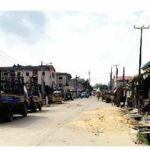
The Chairman, Wilson Badejo Foundation, Dr Osaren Emokpae, on Wednesday, said looting of public funds is responsible for the insecurity afflicting Nigeria.
Emokpae made the statement in Lagos while addressing journalists during a press conference on the foundation’s 15th annual lecture.
The lecture is scheduled to hold on Wednesday, August 10, 2022, at the Nigeria Institute of International Affairs, Victoria Island, Lagos.
Emokpae said the lecture would focus on poverty and insecurity in the country.
He said issues based on the misery index in Nigeria compared to other African countries; looting of public funds; Nigeria corruption index compared to other countries; Nigeria life expectancy compared to Egypt and South Africa, among others, were part of the challenges affecting the country.
On the looting of public funds, Emokpae said, “Looting of the nation’s wealth has caused gross insecurity today and everyone is feeling the negative effect of it. Ever since independence, the theme of looting, embezzlement and general corruption is not new in Nigeria’s socio-political and economic space.
“At the commencement of the Fourth Republic in 1999, the Nigerian government, announcing a zero tolerance for the looting carnival of her national treasury, set up two anti-graft bodies, the Economic and Financial Crimes Commission and the Independent Corrupt Practices and Other Related Offences Commission.
“Despite this, the flurry of broad-day plunder of the state’s wealth has continued unabated, especially among politicians and government officials.”
Speaking on the current state of insecurity in the country, Emokpae said the country’s insecurity challenges were multi-dimensional, adding that they include, “Boko Haram Islamic extremism; militancy in the Niger-Delta; incessant kidnappings; Fulani Herdsmen crisis; Banditry and unknown gunmen crises in the South-east; ritual killings, and armed robbery.”
The chairman, while commenting on the poverty levels in the country, said the World Bank, in its poverty assessment report titled, ‘A Better Future for All Nigerians: 2022 Nigeria Poverty Assessment,’ stated that the number of poor Nigerians was projected to hit 95.1 million by the end of 2022.





